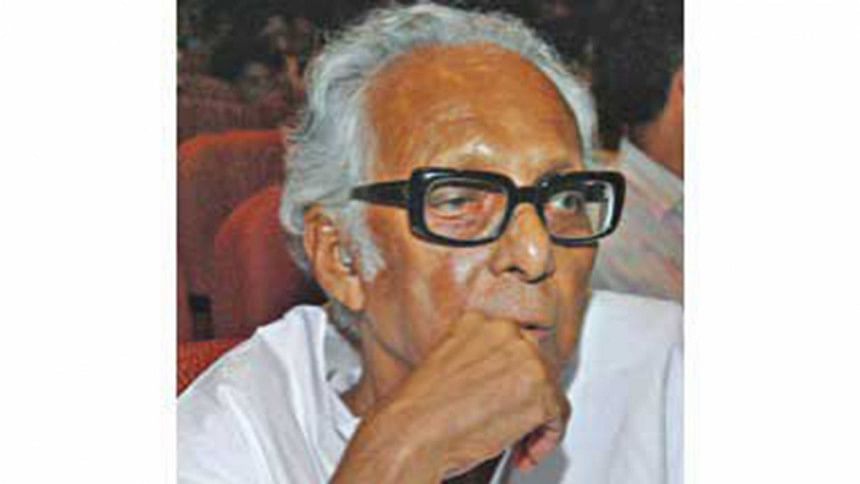'A loss to the world'

Mrinal Sen, one of the towering figures of Indian cinema, passed away yesterday morning at his south Kolkata residence. He was suffering from age-related ailments and suffered a heart attack at 10.30am, his family physician said. He was 95.
Last of the triumvirate of legendary filmmakers from West Bengal comprising Satyajit Ray and Ritwick Ghtatak, Mrinal Sen was recipient of various awards including Dada Saheb Phalke award, India's highest film honour, in 2005. He was awarded Padma Bhushan - India's third highest civilian award - in 1983.
Mrinal Sen, who believed cinema was not merely a medium of entertainment but could be used to enlighten and educate the masses, was an accidental filmmaker. His interest in filmmaking piqued after he stumbled upon a book on film aesthetics. He then went to make over 30 features besides scripting and producing several films in 60 years of his career.
He made his debut as a filmmaker with a feature film, "Raat Bhore" in 1955, which starred Uttam Kumar. He is known for his acclaimed films like Aakash Kusum (1965), Bhuvan Shome (1969), Calcutta 71 and Interview (1971), Khandhar (1974), Chorus (1975), Mrigaya (1977), Akaler Sandhane (1981) and Ek Din Achanak (1989). Aamar Bhuwan (2002) was his last feature film.
His death has led to an outpour of tributes from stalwarts in the Indian film fraternity and government.
Terming him as “a fine chronicler of our times,” Indian President Ram Nath Kovind mourned his death as “a loss to Bengal, to India and to the world of cinema.”
Indian PM Narendra Modi offered his condolence over the demise of the filmmaker and said "the dexterity and sensitivity with which he made films is noteworthy. His rich work is admired across generations".
Sen, whose body of work is definitively more political than the other two stalwarts, Satyajit Ray and Ritwik Ghatak, was a man who had the distinctly Bengali middle-class quality of mixing the personal with the political. A facet brought forward beautifully in the 1984 film Khandhar.
“Indian cinema had never seen a filmmaker with such compassion, such single-minded drive. All his films, like Khandhar, made their point very strongly. That was always the mark of a Mrinal Sen film. It almost always drove its point home. If (Satyajit) Ray was the great humanist of Indian cinema, Sen was the anarchist, in the nicest sense of the term,” says filmmaker Shyam Benegal, a family friend of the Sens for about four decades.
In his eulogy piece, veteran actor Amitabh Bachchan, addressed Mrinal Sen as the most "distinguished creative cinematic mind." In his tweet, Bachchan also revealed that he did his first voice over in Mrinal Sen's 1969 film Bhuvan Shome.
“Thank u Mrinal Da for touching my life and waking me up to myself,” wrote film director Mahesh Bhatt.
It goes without saying that in the 1960s, along with Ray and Ghatak, Sen laid the foundation for a parallel cinema movement in India. “Sen has always been the most daring and experimental in his work and was never afraid of failures. He was the reason why many like us dared to make the kind of films we made,” says National Award-winning filmmaker Adoor Gopalakrishnan.
Yet, contemporary filmmakers owe a lot to the stalwart too. “Today, we need to take stock of the way this man consistently went against the tide to pave way for future storytellers. Kharij and Akaler Sandhaney are just as valid today. They speak of our hypocrisies and fears, but also about the emotions that redeem us. These emotions are timeless, as are the storytellers who have the ability to capture them honestly,” sums up National Award-winning Bengali filmmaker Kaushik Ganguly.
His trilogy - Interview, Calcutta 71 and Padatik - is considered to be a masterpiece for depicting the social and political upheaval in the Kolkata of the '70s.
The filmmaker achieved national and international acclaim with an array of films in Bengali and Hindi. Kharij, starring Mamatashankar and Anjan Dutta, took home the jury prize in 1983 in the Cannes, Venice, Berlin, Karlovy Vary film festivals.
Retrospectives of his films have been shown in many countries across the world. He had also received the French government's Commander of the Order of Arts and Letters award.
Born on May 14, 1923 in Faridpur, now in Bangladesh, Mrinal Sen was known for his pronouncedly pro-Left ideology.
Mrinal Sen also made feature films in Oriya language. He also has several documentaries to his credit.
Mrinal Sen was a member of the National Film Development Corporation (NFDC) and was chairman of Film and Television Institute of India (FTII). The director was also a member of the Rajya Sabha from 1998 to 2003.

 For all latest news, follow The Daily Star's Google News channel.
For all latest news, follow The Daily Star's Google News channel. 








Comments